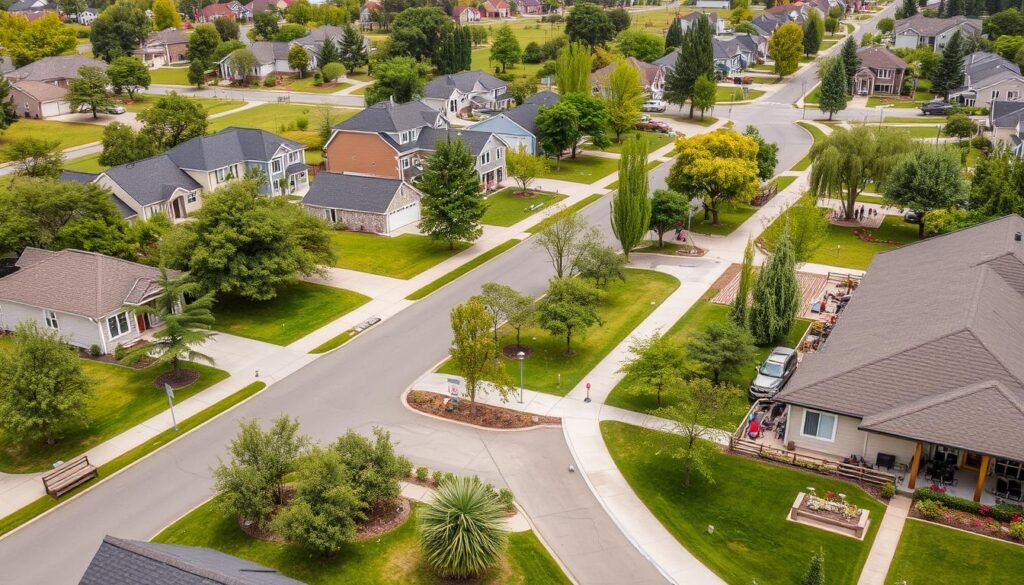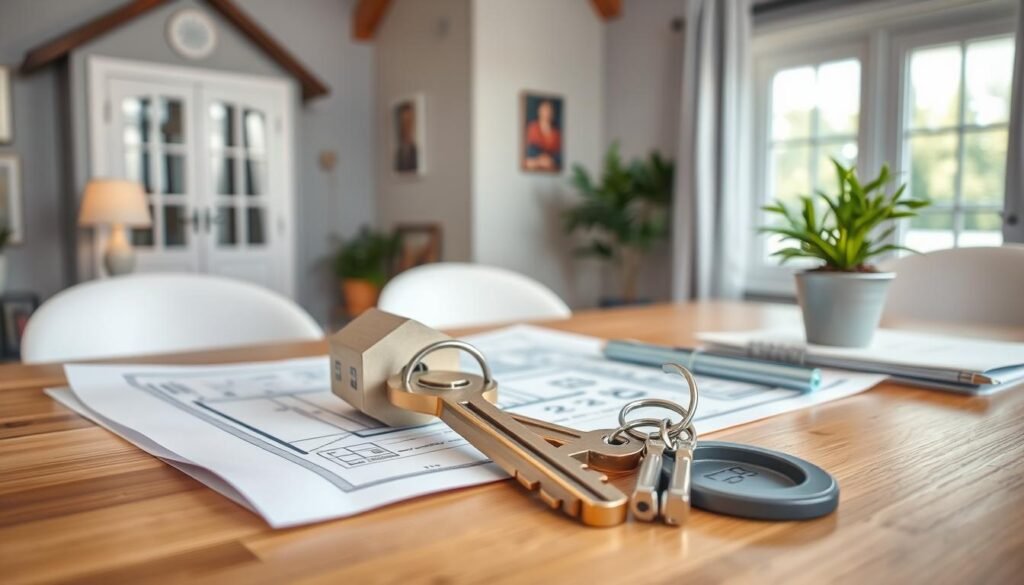This post may contain affiliate links, which means I may earn a commission if you purchase through these links at no extra cost to you
Have you ever wondered what sets a home’s value? The process of appraising a home is key, yet often missed understood during a purchase. Knowing how homes are appraised can make sure you pay the right price. Many factors, including location and recent sales, determine a home’s price.
Table of Contents
ToggleUnderstanding Home Appraisals
The home buying process can sometimes be challenging. Knowing about appraisals helps everyone involved make better decisions.
What is a Home Appraisal?
A home appraisal is done by a certified professional. They figure out a home’s value by checking its condition and comparing it to similar homes. This report gives an impartial value, crucial for buyers and lenders. An appraisal can cost between $300 to $450 and usually finishes in about a week.

Importance of Home Appraisals in Real Estate Transactions
Home appraisals are important in real estate deals. They make sure a loan matches the home’s real worth, reducing risk for buyers and lenders. Lenders rely heavily on these appraisals when deciding on loan amounts.
For sellers, getting a home appraised before listing helps set a good price, makes selling smoother, and avoids deal breakdowns. The appraisal reviews the home’s structure, systems, and market value. If the appraisal is lower than expected, deals could be delayed or called off, emphasizing the need for precise appraisals.
Factors That Influence Home Appraisal Value
Many factors play a big part in home appraisal values, like the neighborhood and unique features of a home.

Location and Neighborhood
Neighborhood desirability is key in home appraisals. Appraisers look at local schools, shops, transport, and prices of recent home sales. Homes in safe, maintained neighborhoods often appraise higher.
Property Size and Layout
The square footage and design of a home are important. Bigger homes with good layouts tend to appraise higher. Yet, homes with odd designs or unused space might appraise for less.
Condition of the Property
A house’s condition affects its value a lot, including the building material and any signs of wear. Appraisers check construction materials and the condition and age of systems. Well-kept older homes usually do better than neglected ones.
Comparable Sales (Comps)
Appraisers compare the sale of similar homes in the area. This method helps find a home’s market value, considering local market trends.
Unique Features
Special features like pools, smart tech, and luxury amenities may add value. Also, energy-saving and green upgrades can boost a home’s appraisal value.
| Influencing Factor | Elements Considered | Impact on Value |
|---|---|---|
| Location | Proximity to services, neighborhood safety | Increases with desirable attributes |
| Size and Layout | Square footage, functional design | Higher for larger, well-designed spaces |
| Condition | Structural integrity, upgrades, system conditions | Higher for well-maintained properties |
| Comparable Sales | Recent sales of similar properties | Reflects current market trends |
| Unique Features | Luxury amenities, energy-efficient updates | Varies by local market perception |
Understanding these factors can give you a better idea of what to expect in your home appraisal. This knowledge can help you prepare and perhaps even increase your home’s value.
Appraiser Qualifications and What They Look For
When getting your home appraised, it’s key to know about appraiser qualifications and what they inspect. Certified professionals have to meet high standards, including special training and lots of experience. They look closely at certain areas of your home and use sales comparisons to figure out its value.

Required Certifications and Experience
To become a certified appraiser, one needs to take educational courses and gain a lot of field experience. They also have to pass exams and keep up with new information to provide accurate appraisals. Their skills are essential for understanding and valuing a property accurately.
Key Aspects Evaluated During an Inspection
A detailed home inspection covers many things. Appraisers check your home’s condition, size, and layout. Things like curb appeal and recent updates, especially in kitchens and bathrooms, matter a lot.
The Role of Comparable Sales
Comparing your home to similar ones that sold nearby is is a key component in setting the property value. This method uses the latest market data.
Home Appraisals Explained for Homebuyers
Getting a grasp on the appraisal process is key for homebuyers. It ensures the price of the property is right and helps get a mortgage approved. Appraisals are needed by lenders to check if the property’s value matches the loan amount. This step protects both the buyer and lender when buying real estate.
Professional appraisers look over the property for several hours. They check its condition, location, and size, and compare it to similar properties. They inspect many things like how big the property is, how many bedrooms and bathrooms it has, and its overall shape to figure out its value. An appraisal report that lists things affecting the home’s value is ready in about two weeks.
Appraisals are a must when you refinance, except in certain refinance programs. This step is vital as it decides the property’s fair market value. This tells lenders how much money they can give out. The appraisal affects whether you get the loan, the interest rates, the mortgage terms, and the cost of the mortgage.
If the appraised value is not the same as the offer price, the deal might need to be discussed again. The buyer may need to pay the difference, or they might walk away if possible.
Appraisals also play a role in figuring out property taxes, which affects your yearly tax bills. Knowing how this works can prevent unexpected issues.
Being ready for the appraisal is smart for both buyers and sellers. Things to do include keeping your home tidy, listing any updates, and fixing problems. When buyers and sellers understand appraisals, they can negotiate better and make smarter choices.
Plus, knowing about appraisals can help you get ready for any issues. This makes getting a mortgage and buying a property easier.
Preparing for a Home Appraisal
Getting ready for a home appraisal can really impact your property’s value. The steps you take in preparation can help get a good outcome. They might even increase the appraised value of your home.
Cleaning and Decluttering
First impressions are key. Cleaning and decluttering can make your home look more inviting. This makes your home seem bigger and better kept. It’s a critical step for a good appraisal.
Minor Repairs and Updates
It’s also important to fix small issues and make updates. Fix leaky faucets, replace broken parts, and paint over chips. Doing these things can help avoid negative points on your appraisal. It can even make your home’s appraisal value go up.
Improving Curb Appeal
The outside of your home is just as important as the inside. A good first impression can come from a nice yard or a fresh coat of paint on the door. Small changes, like trimming the hedges or planting flowers, are impactful.
Documenting Recent Renovations and Upgrades
Make sure to list out any big improvements or updates you’ve made. Include everything from big renovations to small, energy-saving upgrades. This helps make sure your investment is recognized and accurately valued.
Be there during the appraisal to answer questions, but don’t push the appraiser for a certain value.
Preparing for your home appraisal correctly can make sure your hard work is seen in the final value.
The Costs of Home Appraisals
As previously mentioned, prices change due to location and home details. A 2023 survey by the National Association of Realtors (NAR) shows an average appraisal cost at about $500 for a single-family home.
Average Cost Range
The price for appraisals varies by many things. They can be from less than $300 to over $800. This depends on the home’s size, condition, and special traits. For new homes, the cost is higher because of detailed checks needed.
Factors Affecting Appraisal Costs
What changes the price of a home appraisal? Here are some reasons:
- Property Size: Bigger homes need more work to evaluate, making it pricier.
- Required Repairs: Homes that need a lot of fixing can have higher appraisal fees. This is because assessing their value takes more time and effort.
- Comparables: The number of similar sales affects the appraiser’s job. Less comparable sales mean higher costs.
- Geographical Location: City homes and country homes have different costs due to accessibility and market differences.
- Seasonal Conditions: Weather and the season can make inspecting properties harder. For example, snow or rain might increase appraisal costs.
Who Pays for the Appraisal?
The buyer usually pays for the appraisal as part of closing costs. These appraisals are needed by lenders to get a mortgage. Sometimes during negotiations, the seller might pay these fees. The Dodd-Frank Act says neither buyer nor seller can pick the appraiser. This keeps the property’s valuation fair. Appraisers also must follow fee standards that fit their market area.
There can be problems if the appraisal doesn’t meet expectations. Knowing how to challenge an appraisal is important then. This helps buyers ensure they get a good deal.
| Aspect | Details |
|---|---|
| Average Cost (NAR, 2023) | $500 |
| Average Cost (HomeAdvisor, 2023) | $313 – $422 |
| Key Influencing Factors | Property Size, Repairs Needed, Comparables, Location, Seasonal Conditions |
| Appraisal Fee Responsibility | Buyer Usually Pays as Part of Closing Costs; Seller Negotiation Possible |
Last, understanding all about home appraisal costs helps make buying a home easier and clearer.
Final Thoughts
Understanding property value and getting a detailed home appraisal is key in the homebuying process. It helps buyers, whether first-timers or seasoned investors, make wise choices. By preparing your property and ensuring it’s well assessed, you can greatly affect the appraisal’s outcome.
A home appraisal report showcases pictures of your home and the area around it. This helps give a clear view of what’s being evaluated. Appraisers are independent, licensed experts who focus on fairness. They look at things like home amenities, size, and layout. The buyer usually pays the fee for this service at closing, which is a small price for peace of mind.
Appraisals are not just for buying homes but also for refinancing and securing home equity loans. Lenders use them to understand a property’s value and equity. This step prevents unexpected financial issues. If you disagree with an appraisal, there is an option to challenge it with new evidence. This knowledge can ease your stress and protect your money and home value.
Getting to know how home appraisals work is valuable. It helps when you’re dealing with lenders, getting ready for an appraisal, or reviewing the final report. Armed with this information, you’re on your way to a successful and satisfying experience in real estate. Take this advice to heart for a smooth path to owning a home and growing your real estate portfolio.



